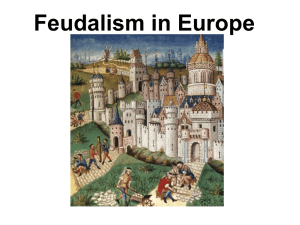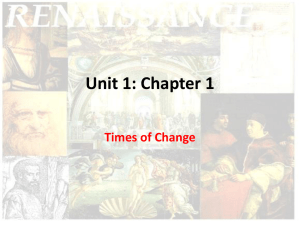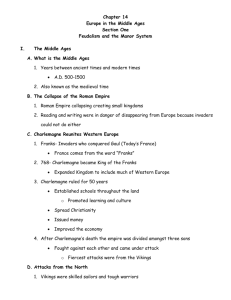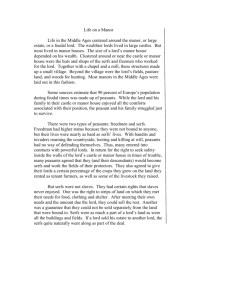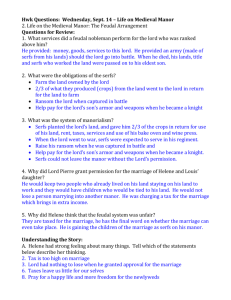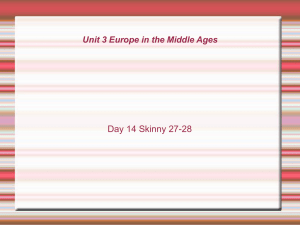Could a Serf Gain Freedom? - Boyertown Area School District
advertisement
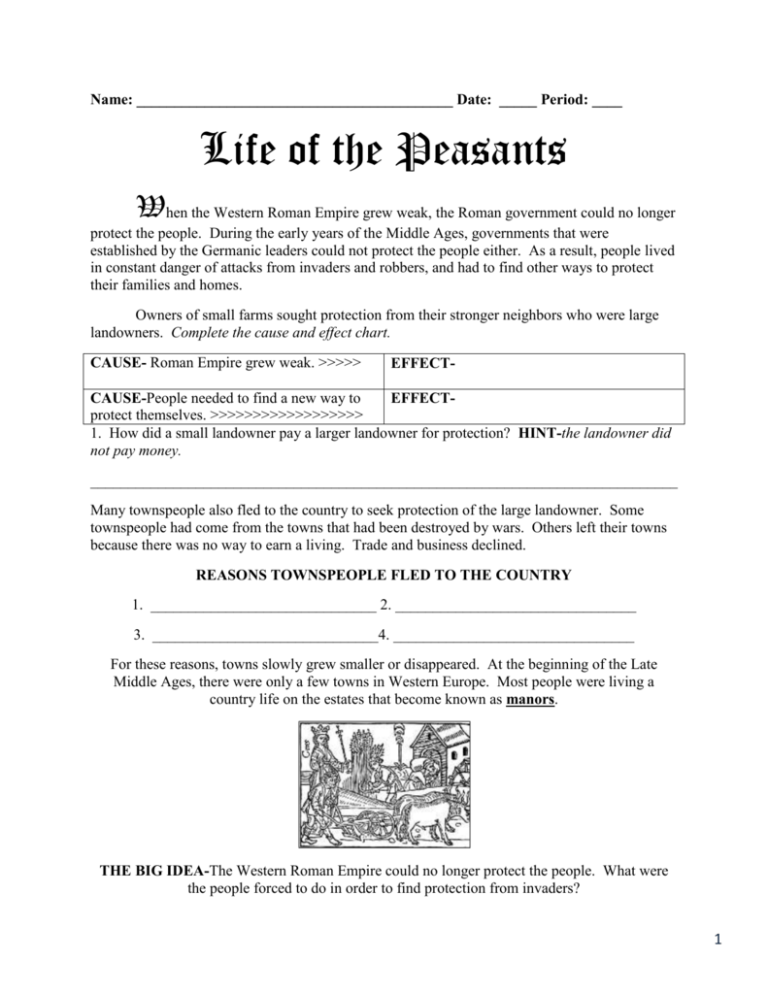
Name: __________________________________________ Date: _____ Period: ____ Life of the Peasants When the Western Roman Empire grew weak, the Roman government could no longer protect the people. During the early years of the Middle Ages, governments that were established by the Germanic leaders could not protect the people either. As a result, people lived in constant danger of attacks from invaders and robbers, and had to find other ways to protect their families and homes. Owners of small farms sought protection from their stronger neighbors who were large landowners. Complete the cause and effect chart. CAUSE- Roman Empire grew weak. >>>>> EFFECT- CAUSE-People needed to find a new way to EFFECTprotect themselves. >>>>>>>>>>>>>>>>>> 1. How did a small landowner pay a larger landowner for protection? HINT-the landowner did not pay money. ______________________________________________________________________________ Many townspeople also fled to the country to seek protection of the large landowner. Some townspeople had come from the towns that had been destroyed by wars. Others left their towns because there was no way to earn a living. Trade and business declined. REASONS TOWNSPEOPLE FLED TO THE COUNTRY 1. ______________________________ 2. ________________________________ 3. ______________________________4. ________________________________ For these reasons, towns slowly grew smaller or disappeared. At the beginning of the Late Middle Ages, there were only a few towns in Western Europe. Most people were living a country life on the estates that become known as manors. THE BIG IDEA-The Western Roman Empire could no longer protect the people. What were the people forced to do in order to find protection from invaders? 1 The Manor The large landowner of the earlier years of the Middle Ages came to be called a landlord or a lord in the late Middle Ages. He belonged to the class of the nobles. His great estate was called a manor, which was like a farm community. The lord’s home was the chief building on the manor, but there was also a village of small houses on a single street. These were the homes of the people who lived and worked on the manor. Nearby was a village church, a fish pond or stream, a mill for grinding grain, a wine press, and a blacksmith’s workshop. Circle the following places on the manor map-Lord’s home, serf’s homes, village church. STROMFORD Different parts of the manor were used for different purposes. Crops were grown on the best land. Cattle grazed on the pasture. Some areas were covered with forest that furnished wood for the lord’s fireplaces and lumber for new construction of wooden buildings. There were also orchards and vineyards. Nearly everything that was needed, food, clothing, and shelter, was grown or made there. The people who worked on the manor, most of whom were farmers, became known as peasants. 1. Everything people needed could be found on the manor. Like monks, the people living on the manor were part of a _______________________ ______________________ community. 2. People stopped ______________ because they had everything they needed to survive on the manor. 3. The farmland on the manor was usually divided into three fields. Each year one field was left idle while two were planted. Why? ______________________________________________________________________________ 4. What is the name of this farming technique? ______________________________________________________________________________ 2 Serfs Up Most of the peasants were serfs. Serfs were not free, but neither could they be sold, as slaves of ancient Rome had been. The serfs were bound to the land where they had been born. That means that they could not move away from the manor. They could not even leave the manor without the lord’s permission. If the manor changes hands, the serfs remained on the manor with the new lord. How would you feel if you were never allowed to leave your neighborhood? ______________________________________________________________________________ ______________________________________________________________________________ Freemen Usually one or two peasants on a manor were freemen. They also worked for the lord, but they could move away from the manor whenever they wished. They lived in peasant huts and paid the lord rent in work and goods. The freemen were usually the workers who made the plows, shod the horses, and made the harnesses for the oxen and horses. 1. The poor people who worked on the manor were called peasants. There are two types of peasants. A.____________________ were peasants who were forced to live and work on the land where they have been born. B.____________________ were peasants who worked on the manor but could leave whenever they wished. 3 The Serf and his Lord Usually, fields of the manor were divided into strips. The lord kept the best strips to grow crops for his own household. Each serf was given the use of three to four strips scattered throughout the fields (see map from page 2). The crops the serf raised on his small plots of land were never very large, but he had to pay part of them to his lord. If he had grain to grind, he was required grind it in the lord’s mill. Then part of the flour went to the lord. The serf’s wife had to bake her bread in the lord’s oven and then take some of her loaves to the lord’s house. The lord also claimed part of the wine if his serf made some in the lord’s wine press. Besides these dues to the lord, the serf had to work on the land that the lord kept to himself, usually for three days a week. At harvest time, the serfs had to gather the lord’s crops before they could harvest their own. Even though he worked very hard the serf had little on which to live. The lord had obligations to his serfs, too. Besides giving him land to live on, the lord had to protect him in case of attack from people outside the manor. The lord also held a court in which he often defended innocent serfs against fellow serfs. The lord and the serfs had obligations to each other. Complete the chart. List the duties that a serf had to perform for the lord. List the obligations a lord had towards the serfs of his land. Manor Obligations Duties of Serfs Duties of the Lord 4 Directions: Read the following selection and answer the question at the bottom of the page. The Life of a Serf The serf and his family lived in a small one room hut that was crudely made. The floor was the ground. The walls were rough stone picked up in the fields or of the tree branches that were woven together and smeared with a combination of wet soil, clay, sand, animal dung and straw. This wall making combination was called waddle and daub. The fire, built in the middle of the floor, furnished heat and light as well as means for cooking food. The smoke from the fire was let out of the room through a hole in the thatched roof of straw and reeds. Light came in through a single window or an open door. The father, mother, and children slept on a heap of straw covered with a coarse woolen blanket. The serf’s house was often shared with farm animals. Pigs usually wandered in and out, leaving some presents along the way! If there was no chicken coop, chickens sometimes came in too. The men and women wore drab disgustingly filthy tunics that reached to their knees. The tunic was fastened around their waist with a leather rope or belt. In cold climates, serfs wore strips of woolen cloth around their legs and homemade leather shoes. In warm climates men and women went barefoot. The serf worked long, hard hours, for he used crude tools. A simple wooden plow drawn by the oxen was used to prepare the ground in the spring. Then the serf sowed the seed by hand and harvested the grain with a hand sickle. Besides making, mending, and washing the clothing, the serf’s wife worked with her husband in the fields. She prepared family meals, usually only dark bread and soup, and took care of the children. Sometimes she was called upon to help do work in the lord’s house. Nearly all of the children of the serf’s family began planting, weeding, and carrying heavy loads when they were very young. There were few schools, and a boy was very lucky if anyone on the manor could teach him to read and write. A few bright boys were trained to be priests. It is no wonder that holidays meant so much to the serf and his family. Not only was there no work on Christmas, Easter, and other religious holidays, but the lord usually gave food and drink to his serfs. After religious services, there was dancing, singing, and games for everyone. A holiday was a break in the dreary dismal life of hard soul crushing work. Why were the holidays so important to the serfs? ______________________________________________________________________________ ______________________________________________________________________________ 5 Directions: You have read the following selection. Imagine that you are serf. Write a historical account of a day in your life that describes all the horrible and retched aspects of your life as a peasant serf. You should be able to use all the prior information including Crispin: The Cross of Lead, and the preceding. Be prepared to share your account with emotion and enthusiasm for the entire class! ______________________________________________________________________________ ______________________________________________________________________________ ______________________________________________________________________________ ______________________________________________________________________________ ______________________________________________________________________________ ______________________________________________________________________________ ______________________________________________________________________________ ______________________________________________________________________________ ______________________________________________________________________________ ______________________________________________________________________________ ______________________________________________________________________________ ______________________________________________________________________________ ______________________________________________________________________________ ______________________________________________________________________________ ______________________________________________________________________________ ______________________________________________________________________________ ______________________________________________________________________________ ______________________________________________________________________________ ______________________________________________________________________________ ______________________________________________________________________________ Could a Serf Gain Freedom? There were a few serfs who tried to escape their masters. If a serf could run away and manage not to be captured for a year and a day, he was a freeman. This was not easy to do because no other lord would take a strange serf onto his manor. If he went to a town, it would be hard for him to find work. Sometimes a lord granted his serf freedom because of an unusual service he performed. A servant who had gone to live in a monastery would be a freeman. It was unusual, however for a serf to gain his freedom. Most serfs lived out their lives rotting away on the manor in which they were born. List the ways in which a serf could gain his freedom. ______________________________________________________________________________ ______________________________________________________________________________ ______________________________________________________________________________ ______________________________________________________________________________ ______________________________________________________________________________ 6

